牛津译林版六年级下Unit2 Period 2课件
译林版 小学六年级下册 Unit2 第一课时 ppt课件

What do you think of Liu Tao?
__G_o_o_d__ habits
__B_a_d___ habits
What happens to Liu Tao? Why?
and
Liu Tao well.
are good friends. Wang Bing knows One day, they met on the way to school.
goes to bed early never goes to bed late
What do you think of Wang Bing?
How about Liu Tao?
Tip: 快速阅读并划出关于评价Liu Tao的句子。
What are Liu Tao’s habits?
Good
Bad
listens to his teachers
keeps his room clean and tidy
helps his parents
wash dishes clean the table sweep the floor clean the room ...
Bad habits
does his homework late at night
1. ... listens to … 2. He keeps his room… 3. He helps… 4. He often does ... 5. He sometimes feels...
Discuss: What are good habits?
_____G_e_t _u_p_ early in the morning. Do not go to school ___la_t_e___. Listen to your ____te_a_c_h_e_rs___ at school. Finish your ___h_o_m_e_w_o_r_k __ early. Help your ____p_a_r_e_nt_s__ at home. Keep your room ____cl_e_a_n_a_n_d_ti_d_y_. ______G_o__to_b_e_d__ early at night.
牛津译林版六年级下Unit2 Period 3课件

Read and think
walk fast
run fast jump high sit quietly sing excitedly
动词 副词
laugh happily
run slowly cry sadly walk slowly laugh loudly
fast
slowly
Rules: 给你看到的动词加上一个合适的副词
My bad habits
I always go to bed late. ————————————— ————————————— ————————————— —————————————
—————————————
—————————————
Homework:
1.Share the story with your friends. 2.Try to form and keep your good habits, correct your bad habits.
What is Tina doing?
带领……参观……
Tips:自读图2-4后完成表格
Rooms How is it?
living room Tina’s bedroom Bobby’s bedroom
big and clean small, but nice messy
What will you say to Bobby?
Tips: 请不要忘了使用never, always, usually……等频率副词哦!
My good habits
I always brush my teeth ————————————— in the morning and before ————————————— bedtime. ————————————— —————————————
译林牛津版六年级英语下册教案 Unit2 Period 2

Unit 2 Good habits第二课时一、教学内容:Unit 2 Good habits-Grammar time & Fun time二、教学目标:1.能够在句子中正确应用程度副词修饰动词。
2.能够应用本课所学的句型“Do you...?”“Yes, I do./No, I don’t.”进行问答。
3.培养学生养成良好的学习习惯和生活习惯。
三、教学重点:1.能够在句子中正确应用程度副词修饰动词。
2.能够应用本课所学的句型“Do you ...?”“Yes, I do./N o, I don’t.”进行问答。
四、教学难点:1.能够在句子中正确应用程度副词修饰动词。
2.能够应用本课所学的句型“Do you ...?”“Yes, I do./No, I don’t.”进行问答。
五、教学过程:Step 1 Free talkT: Do you get up early in the morning?S: ...T: That’s a good/bad habit!T: I have some habits too, can you ask me? (出示动作图片)S: Do you have your meals in the morning?T: Yes, I do. I always...S: Do you read books?T: Yes, I do. I usually...S: Do you clean the room?T: Yes, I do. I sometimes...T: I have some good habits but I have bad habits too. Look at my panda eyes, I always go to bed late at night, it is a bad habit, you should go to bed early.Step 2 PresentationT: As a good student, we should have good habits, let’s make a good habit proposal step by step.1. Step 1 How to ask others.T: You know my habits, how about you? let’s play a game. Who want s to be my partner?Fun time----(1) T: Pick one...(2) S: Pick one...(3) Pair workT: Now, it’s your turn, pick one picture from the envelope and practice in pairs!Magic box----T: Good job, boys and girls, you can ask others about their habits. Let’s have a rest.2. Step 2 How to make.First, Pick 4 different color papers from the box.Second, discuss in groups and make them into a sentence, then stick it to the long paper.Third, read in group and show us in your own way.评价:I t’s interesting/funny...Here are some sentences for you, can you read them?Look, these words are subjects/adverbs of frequency/verbs/adverbial modifiers. Do you understand?Step 3 Consolidation1. Step 3 Do a surveyT: Great, l et’s mo ve to step 3 do a survey. First, let’s make a survey form.Here is an example, fill one word into the blank and make it a good habit.S: Early.T: Can you read it?S: Go to bed early at night.T: Here is another form, can you fill this line with your group member? Let’s check together. The first one is early, please read it.The first one is well, please read it.The first one is early, please read it.They are all good habits. Now, let’s do a survey.Do you go to school early in the morning? (随机问一名学生)S: Yes, I do. (将该学生姓名填入表格)Do a survey in your groups with this form.提示句型:Do you...? Yes, I do./No, I don’t.T: Ok, times up, I am going to be the first one. (教师示范)...It’s time for you, who want s to tell us about your group members? S: ...2. Step 4 Make a good habit proposalT: Let’s make a good habit proposal according to your group survey.Here is my good habit proposal. Work in groups to finish your good habit proposal. Here are some tips for you.评价:If everyone in your group says one sentence, you will get 3 stars.If all the members in your group say together, you will 2 get stars.If only group leader says, you will get 1 star.Step 4 Homework1.Think of some more good habits and share with your classmates.2.Put up your good habit proposal in the classroom or at home.3. Review the two parts and then copy the sentences in Grammar time.六、板书设计:Unit 2 Good HabitsA: Do you...?B: Yes, I do./ No, I don’t.always usually often sometime never。
(沪教牛津版)六年级英语下册课件 MODULE2 unit2

together
Alice and Kitty are good friends. So they …
go to school together. play together. go home together. do homework together. … together.
the same or different
2. Read and recite “making new friends”.
in different blocks. Kitty lives in Block 1 and Alice lives in
Block 3.
2
Kitty and Alice usually go to school together.
Sometimes they like to eat their lunch together and share their food.
We like each other. We are good friends.
Think and write
My friend is _____.
help each other. share our lunch/breakfast/sweets/biscuits. always walk/go to school together. We usually do our homework together. sometimes ride our bicycles together. watch television together. play together after school/at the weekend.
Ocean Park
Water World
Project 2 第二课时小学英语六年级下册 译林版(三起)

The students talk about these questions in their groups.3.The students make a class travel book.T:Now we have known your favourite city. Let’s write about our favourite city. First, stick a photo of your favourite city on page101.(四人小组完成一张)Then write about the city on it.(The students can write one by one)(小组内其他三位同学负责提问,剩下的一位先回答组员问题,再写下所需信息。
)Don’t forget to write down your names.Let’s cut down this page.Then stick them together.The class travel book is finished. You can do the show-and-tell now.Let me do it first.Nanjing is my favourite city. It’s in Jiangsu China. The weather is sunny and cloudy. You’ll see the Confucian Temple, the Zhongshan Cemetery and Purple Mountain in Nanjing. You’ll eat boiled salted duck there. It’s my show-and-tell. What about yours? S:...T: Somebody may have a dream that travel all over the world. Hope your dream will come true one day.Step 3. ConsolidationNow I think you can write a short passage about your favourite city.作业设计 1.Write a short passage about your favourite city.2.Show your favourite city to your parents.板书设计单元教学后记结合城市图片,要求学生快速说说这个城市的气候特征、特色。
最新英语译林牛津版小学六年级下册Unit2Period2优质课课件
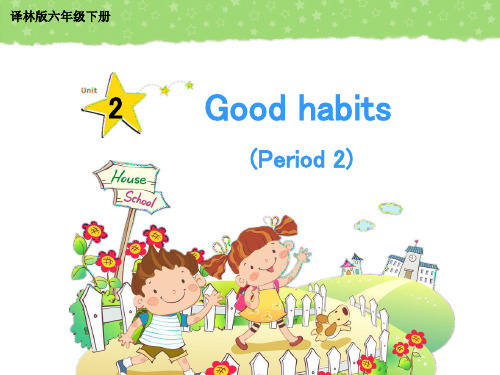
3.Nancy feels sleepy (sleep) in the morning.
4.He never goes (go) to work by car. (do) our homework
5.We often do before dinner.
Grammar time
Name
Activities How Work in pairs When/Where What goodembers and you have? Let‘s make a survey form. Please work in four.
Choose and judge
s
.
A B
I you we they he she First, choose one wordWang or Mike Nancy Yang Ling Bing phrases from A/B/C to a sentence. usually always make often sometimes never Then, judge it’s a good habit or bad habit. go to bed late walk fast eat fast eat slowly sweep the floor get up early have breakfast late finish homework early put one’s things in order
C
好习惯成就美好未来。
Homework
1.Think of some more good habits and share with your classmates. 2. Put up your good habit proposal in the classroom or at home. 3. Review the two parts and then copy the sentences in Grammar time.
牛津译林版六年级下Unit2 Period 2课件
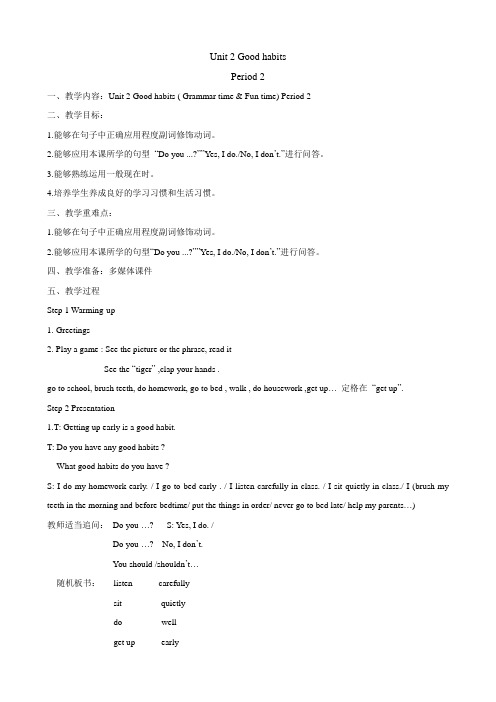
Unit 2 Good habitsPeriod 2一、教学内容:Unit 2 Good habits ( Grammar time & Fun time) Period 2二、教学目标:1.能够在句子中正确应用程度副词修饰动词。
2.能够应用本课所学的句型“Do you ...?””Yes, I do./No, I don’t.”进行问答。
3.能够熟练运用一般现在时。
4.培养学生养成良好的学习习惯和生活习惯。
三、教学重难点:1.能够在句子中正确应用程度副词修饰动词。
2.能够应用本课所学的句型“Do you ...?””Yes, I do./No, I don’t.”进行问答。
四、教学准备:多媒体课件五、教学过程Step 1 Warming-up1. Greetings2. Play a game : See the picture or the phrase, read itSee the “tiger” ,clap your hands .go to school, brush teeth, do homework, go to bed , walk , do housework ,get up…定格在“get up”.Step 2 Presentation1.T: Getting up early is a good habit.T: Do you have any good habits ?What good habits do you have ?S: I do my homework early. / I go to bed early . / I listen carefully in class. / I sit quietly in class./ I (brush my teeth in the morning and before bedtime/ put the things in order/ never go to bed late/ help my parents…)教师适当追问:Do you …? S: Yes, I do. /Do you …? No, I don’t.You should /shouldn’t…随机板书:listen carefullysit quietlydo wellget up earlynever go to school late2. Fun time:T: I think you have a lot of good habits. How about the boy?出示Fun time Piture1T:He goes to bed early in the evening.Talk about the other pictures.T: Now let’s make some dialogues about the pictures. Who can make it with me ?T: Pick one !S1: Ok. I pick Picture 1.T: Do you go to bed early ?S1: Yes, I do ./ No, I don’t..T: That’s a good habit. / You should …S1: Thank you./ I know. Thank you .3. Grammar time:T: I think good habits are useful in our life. So please keep good habits. Now look at the blackboard again. Read them again .listen carefullysit quietlydo wellget up earlynever go to school lateT: Pay attention “listen carefully and sit quietly”. What’s the rule?S: 修饰动词用副词。
译林版 小学六年级下册 Unit2 第二课时 ppt课件

Period 2 Grammar time,Fun time
译林版六年级下册 英语
Teaching Contents 教学内容: Grammar time&Fun time Teaching aims and learning objectives 教学目标: 1. 能根据关键词或图片复述课文; 2. 能正确运用副词和一般现在时对习惯进行评价和总结,并对家人、朋友提出
Fun time
How about your parents ?
Do they usually keep the things in order? Do they often watch TV late at night? Do they sometimes get up late? Do they always look down at the mobile phones? Do they often play computer games?
Homework
1.Read Grammar time on page 19.(朗读第19页上的句子。)
2. Talk about your friends' habits.(说一说好朋友的习惯)
3. Write a letter and give some good advice to your parents. (给朋友写信并提出一些好建议。)
Yes, I do.
That’s a good habit.
Thank you!
Fun time
Let’s practice:
A: Do you …? B: Yes, I do. / No, I don't. A: That’s a good/ bad habit. B: Thank you. / I’m sorry.
译林版六年级英语下册 Project 2(教学课件)

the Great Wall, the Summer Palace,
Interesting places the Palace Museum, Tian’anmen Square…
Food
Beijing Roast Duck…
Step 2: Work in pairs to make dialogues.
It’s usually... You’ll see... You’ll eat...
C Stick a photo on page 101 and write about your favourite city. Make a class travel book of the cities. Then do show-and-tell.
A. a shoe shop B. a restaurant C. a supermarket
二、按要求改写句子。
1. Su Hai wants to be an artist. (对划线部分提问) __W__h_a_t __ ___d_o_e_s____Su Hai ____w_a_n_t___to _______?
… is my favourite city. It’s in… The weather is… You’ll see… You’ll eat…
Step 1: Fill in the table.
About ___B_e__ij_in_g________
Weather
hot in summer and cold in winter
Homework
Make a travel book about your favorite city. Write a short passage to introduce your favorite
译林-英语六年级下册---第二单元-Unit-2-Good-habits课件
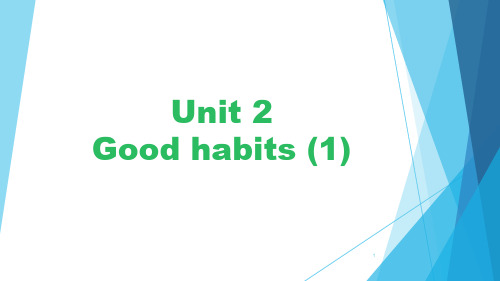
1.... listens to … 2. He keeps his room… 3. He helps… 4. He often does ... 5. He sometimes feels...
32
Grammar time
Let’s review these.
33
Let’s read.
副词
I We They He
She He never
walk do
fast in the street well at home
.
gets up
early in the morning
goes to school
goes to bed late
goes to bed late
.
注意:副词修饰动词,位于动词之后。
34
Make a survey .
Name
Activities go to bed
How early
When/Where at night
Name Activities go to school do go to bed
How early well early
When/Where in the morning
at home at night
18
Let’s play.
单词对抗赛
将全班分成若干小组,对抗赛在两个小组中进行,在教
师宣布游戏开始后,第一组的第一名学生立即用中文说出一
个单词(如:自行车),第一组的第二名学生应立即将这个单
词说出来,说错或不能迅速说出单词的记负分,最后哪组扣
分最少就获胜。
考查单词为:
child habit never late put…in order finish tidy bad
牛津译林版六年级下册英语《Our dreams》PPT课件(第2课时)

children. Yang Ling: I want to be a pianist. Music makes people happy.
to the Moon
Listen and match an astronaut
care about 关心,在乎
help children care about their
teWetohrld Cup
世界杯
a football playLbeieruaTfaooo:pCtIlbuapwaylalinnpttlahtoeyeWr.orld
LT
He wants to...
Nancy SH YL
She wants to ... Dancing makes people healthy and beautiful. Music makes people ...
Reading
Read the text by yourself loudly.
careful care about
关心,在乎
an astronaut
help children care about their teeth
a football player
play in the World Cup
Mike: I want to be a dentist.
Many children don’t care
5. Nancy wants to be _______________ . 6. Yang Ling wants to be ___________ .
六年级英语下册Unit 2知识点汇总(新版牛津译林苏教版)
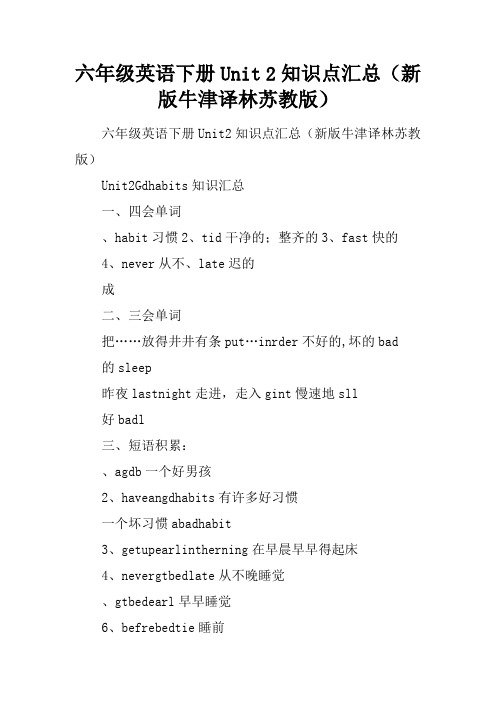
六年级英语下册Unit 2知识点汇总(新版牛津译林苏教版)六年级英语下册Unit2知识点汇总(新版牛津译林苏教版)Unit2Gdhabits知识汇总一、四会单词、habit习惯2、tid干净的;整齐的3、fast快的4、never从不、late迟的成二、三会单词把……放得井井有条put…inrder不好的,坏的bad的sleep昨夜lastnight走进,走入gint慢速地sll好badl三、短语积累:、agdb一个好男孩2、haveangdhabits有许多好习惯一个坏习惯abadhabit3、getupearlintherning在早晨早早得起床4、nevergtbedlate从不晚睡觉、gtbedearl早早睡觉6、befrebedtie睡前7、gtbedlatelastnight昨晚很晚睡觉8、finishhisher完成家庭作业9、finishpriarshl小学毕业0、befredinner在晚饭前1、afterlunh午饭后2、shuldn’tghelate不应该晚回家3、dellathe在家做得好4、eephisrleanandtid保持房间干净并整洁6、finish 完困的,困倦差地,不39、dbadl做得不好40、siell游得好42、pine挑一个43、piup捡起来Piitup/pitheup43、piapples摘苹果4、inthestreet在街上三、重点句型Hegetsupearlintherningandnevergestbedlate他早上起床早,从来不晚睡。
2sisterbrusheshisteethintherningandbefrebedtie 我妹妹在早上和睡觉前刷牙。
3Ialasputthingsinrder我总是把我的东西整理得井井有条。
4eusuallfinishurherbefredinner我们通常在晚饭之前完成家庭作业。
Thelistenttheirteahersatshl他们在学校听老师的话。
高中英语(牛津译林版)选修六配套文档Unit 2 Period Three Word版含答案
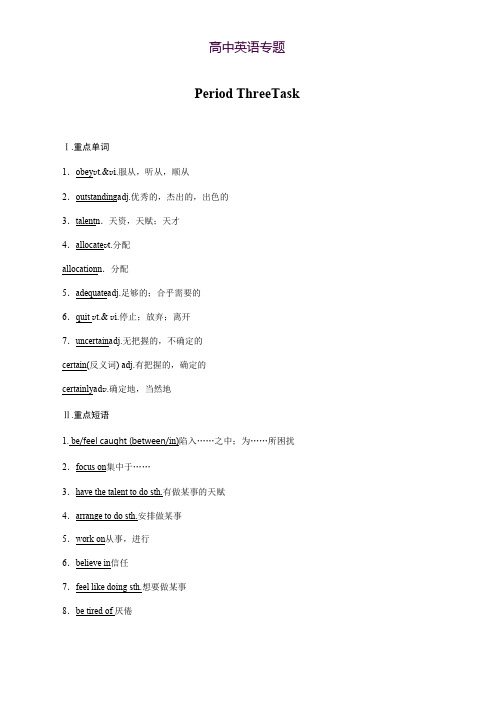
Period ThreeTaskⅠ.重点单词1.obey v t.&v i.服从,听从,顺从2.outstanding adj.优秀的,杰出的,出色的3.talent n.天资,天赋;天才4.allocate v t.分配allocation n.分配5.adequate adj.足够的;合乎需要的6.quit v t.& v i.停止;放弃;离开7.uncertain adj.无把握的,不确定的certain(反义词) adj.有把握的,确定的certainly ad v.确定地,当然地Ⅱ.重点短语1. be/feel caught (between/in)陷入……之中;为……所困扰2.focus on集中于……3.have the talent to do sth.有做某事的天赋4.arrange to do sth.安排做某事5.work on从事,进行6.believe in信任7.feel like doing sth.想要做某事8.be tired of 厌倦Ⅲ.重点句式1.what引导名词性从句I’m an outstanding player,and running around on the basketball court is what makes me happy.我是一个杰出的运动员,在篮球场上奔跑是使我高兴的事情。
2.whichever引导让步状语从句Whichever way I look at it,I’ll never be really good at anything unless I quit doing everything else. 不管我以什么方式看待这件事,除非我放弃做别的一切事,要不然我真的什么也做不好。
3. have problems (in) doing sth.Many people have problems finding(find) enough time to study.很多人很难找到足够的时间来学习。
Unit 2 (第1课时)-译林牛津版英语六年级下册

Who are they ?
show…around…
带领……参观……
Homework
1.Think of some more good habits and share with your classmates.
2. Put up your good habit proposal in the classroom or at home.
My habits I have some habits. I get up early in the morning. I often help my mother . I always put things in order. But I have a bad habit. I always go to bed late.
clean and tidy Go to bed
Let’s write
Do you…?
Wang Bing
get up early never go to bed late brush teeth put things in order finish homework before dinner
Liu Tao
get up early
go to bed early
Good habits
Let’s classify
Bad habits
keep his room clean and tidy
finish homework late at night
finish homework before dinner
go to bed late
listen to his teachers
What habbits do we have ?
六年级英语下Unit2 Period 2课件教案(牛津译林版)英语课件PPT

Think and do
1.I always __h_a_v_e__ (have) breakfast on time. 准时
2.They often ___d_o____ (do) their homework in the evening.
3.He sometimes ___fe_e_l_s___ (feel) sleepy in the morning.
Unit 2 Good habits
Grammar time & Fun time
Play a game
Rules: 1.See the picture or the words, read it. 2.See the “tiger”, clap your hands.
Play a game pluist ttdehhcnoleialsethvrgotauieosnbhngbthbitoserthoiestetbmaheumekraepiodfuncwaoshsotmiehtcrrkesbin
helps his parents
51.不要在这个努力拼搏的年纪去选择安逸。 39.成就一个人的是梦想,毁灭一个人的是欲望。就看是否懂得在适当的时候放下欲望,历经挫折后仍有气力承载起自己的梦想,没有梦想,何必远方! 70.坚持把简单的事情做好就是不简单,坚持把平凡的事情做好就是不平凡。所谓成功,就是在平凡中做出不平凡的坚持。 100.现在的付出,都会是一种沉淀,它们会默默铺路,只为让你成为更好的人;不要去欺骗别人,因为你能骗到的人,都是相信你的人;没有过不去的事情,只有过不去的心情。只要把心情变一 变世界就完全不一样了。
4.We usually __f_i_n_is_h___ (finish) our homework before dinner.
牛津译林版六年级英语下册Unit2 cartoon课件

_____________, and _______________.
Homework
1.Read sound time and the story three times. 2. Tell the story to your parents.
or
world
work north pork
Let’s think
/ə/
actor
doctor
/ə:/
work world
We can take nice apples and flowers to Tina’s house.
or corn north forty pork morning
Tina’s house
Miss Rabbit and Mr. Duck come to Tina’s house, too. They go into the house.
Listen and answer
How many rooms do they talk about? What are they?
Three. They are a living room, Tina’s bedroom and Bobby’s bedroom.
Thank you!
有古
一人
个云
在:
路“
上读
。万
”卷
从书
古,
至行
今万
,里
学路
习。
和”
旅今
行人
都说
是:
相“
辅要
相么
You made my day!
- 1、下载文档前请自行甄别文档内容的完整性,平台不提供额外的编辑、内容补充、找答案等附加服务。
- 2、"仅部分预览"的文档,不可在线预览部分如存在完整性等问题,可反馈申请退款(可完整预览的文档不适用该条件!)。
- 3、如文档侵犯您的权益,请联系客服反馈,我们会尽快为您处理(人工客服工作时间:9:00-18:30)。
Read and think
listen sit 动词 carefully quietly +副词
…
修饰动词(词组)用副词
Think and say
说出更多的动词+副词的词组: listen carefully write carefully walk carefully speak loudly dance beautifully laugh happily cry sadly ask sadly talk excitedly walk fast run fast jump high do well swim well work hard get up early go to bed late
Read and think
频率副词
always often never
usually
sometimes
Fun time
T: Does he (always, usually, often, sometimes, never) go to bed early ? S1: Yes, he does . S2: He (always, usually, often, sometimes, never) goes to bed early. T: That’s a good habit. T: Does he (always, usually, often, sometimes, never) go to bed early ? S1: No, he doesn’t. S2: He (always, usually, often, sometimes, never) goes to bed late. T: Is that a good habit ? S1: No, it isn’t.
Play a game
get up
Fun time
T: Pick one ! S1: OK. I pick Picture 5 T: Do you get up early ? S1: Yes, I do . T: That’s a good habit. S1:Thank you .
T: Pick one ! S1: OK. I pick Picture 1 T: Do you go to bed early ? S1: No, I don’t. T: You should … S1: I know. Thank you .
1. Talk about your good habits or someone’s good habits.
2. Preview cartoon time and checkout time.
Revision:
Good habits
Bad habits
Wang Bing
gets up early never goes to bed late brushes his teeth twice a day puts his things in order finishes his homework eaay (Make some new sentences):
I, You, She, They, He, We…
listen carefully, walk fast, write carefully , run fast, walk carefully , jump high, dance beautifully, do well, speak loudly , swim well, laugh happily, work hard, cry sadly, get up early, ask sadly, go to bed late talk excitedly…
Liu Tao
listens to his teachers helps his parents
does his homework late
keeps his room clean and tidy goes to bed late
Grammar time & Fun time
Unit 2 Good habits
Play a game
Rules: 1.See the picture or the words, read it.
2.See the “tiger”, clap your hands.
Play a game
listen to his teachers put the have rubbish get breakfast up in the bin do listen his homework to music clean go to the bed room ride a bike
classroom, park, street, home, school, cinema, playground…
I… We … They …
He … She …
Read and think
What’s the difference?
Read and think
一般现在时:表示通常性、规律性、习惯性的状态或 者动作的一种时间状态。
Think and do
1.I always _______ have (have) breakfast on time. 准时 2.They often ________ (do) their homework in the do evening. feels 3.He sometimes _________ (feel) sleepy in the morning. 4.We usually _________ (finish) our homework before finish dinner. goes 5.She never __________ (go) to bed late.
Let's write!
Good habits make our life better!
My good habits
Good habits are very important. I always get up early in the morning. I never go to school late. I often read some books. I sometimes walk after dinner .
have breakfast on time 如果你觉得always做某件事很困难,可 save water do not drive so much 以选择usually/often/sometimes. put the things in order Don’t forget never. …
Homework
